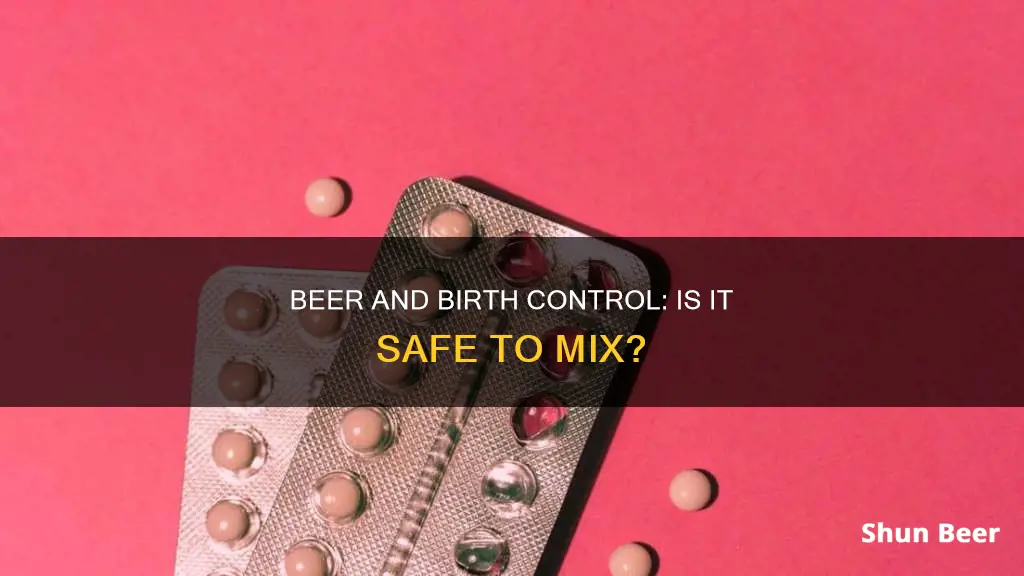
Drinking alcohol while on the pill is a common concern, and it's important to understand the potential risks and side effects. Alcohol does not directly reduce the effectiveness of hormonal birth control methods, including the pill, but it can indirectly impact its efficacy. Here's what you need to know about drinking beer or any alcoholic beverage while on the pill.
| Characteristics | Values |
|---|---|
| Effectiveness of the pill | Alcohol does not affect the effectiveness of the pill |
| Judgement and behaviour | Alcohol can cloud your judgement and increase your risk for unsafe sex |
| Vomiting | If you vomit within 2-4 hours of taking your pill, its effectiveness may be lowered |
| Compliance | Alcohol may cause you to forget to take your pill |
| Alcohol tolerance | Alcohol may affect your alcohol tolerance |
What You'll Learn
- Alcohol does not affect the effectiveness of the pill
- Alcohol can impair your judgment and increase the risk of contraceptive failure
- Vomiting after drinking can reduce the pill's effectiveness
- Alcohol may stay in your body for longer if you're on the pill
- Drinking is not recommended if you are trying to get pregnant

Alcohol does not affect the effectiveness of the pill
If you vomit within two hours of taking your pill, your body might not absorb it, increasing the chance of releasing an egg. This is because it takes at least two hours for the pill to be absorbed by your body. Therefore, vomiting during this window may reduce the pill's effectiveness.
Additionally, alcohol may affect your body's water distribution, which can change the rate at which alcohol is eliminated from your system. This could lead to higher blood alcohol levels and increase your level of intoxication. As a result, you may become intoxicated more quickly and increase the likelihood of missing a dose or forgetting to use protection.
It is important to note that while alcohol does not affect the effectiveness of the pill, it can impair your judgement and increase your risk for unsafe sex. Therefore, it is crucial to drink responsibly and take the necessary precautions to avoid unintended pregnancy and sexually transmitted infections.
Thermal Beer Mugs: How Do They Keep Drinks Cold?
You may want to see also

Alcohol can impair your judgment and increase the risk of contraceptive failure
If you plan to drink, it is important to consider that alcohol may have a more potent effect when combined with birth control. It is recommended to drink less to avoid getting sick, and to set reminders to take your pill. If you miss a pill, use a backup form of birth control, such as a condom, and consult your healthcare provider for further guidance.
Additionally, alcohol can impair your judgment and increase your risk for unsafe sex. It can also affect your ability to correctly use other forms of birth control, such as condoms. Studies have shown that alcohol use is associated with an increased risk of risky sexual behaviour, including inconsistent condom use and multiple sexual partners.
It is crucial to drink responsibly and not to the point of vomiting or endangering yourself or others. If you think alcohol may impair your ability to use birth control effectively, plan ahead. Never drive after drinking, and do not drink alcohol if you are pregnant or think you might be.
Drinking Beer in Autzen Stadium: What's Allowed?
You may want to see also

Vomiting after drinking can reduce the pill's effectiveness
Drinking alcohol while on the pill can be done, but it is important to be aware of the risks and take precautions. Alcohol does not directly affect the effectiveness of hormonal birth control methods, including the pill and emergency contraception. However, it is still important to understand the potential consequences of drinking while on the pill.
One of the main risks associated with drinking alcohol while on the pill is the impact of alcohol on judgement and behaviour. Alcohol can cloud your judgement, increase your risk for unsafe sex, and make it more likely that you will forget to take your pill or use protection. This is especially true if you drink heavily or become intoxicated. Additionally, drinking before your usual time for taking the pill may increase the odds that you will forget to take it on time.
Another important consideration is the potential for vomiting after drinking alcohol. If you vomit within a certain time frame after taking your pill, its effectiveness may be reduced. This is because vomiting can prevent your body from fully absorbing the pill, increasing the chance of ovulation. Therefore, it is recommended to avoid drinking to the point of vomiting, as this can be dangerous and impact the effectiveness of your birth control.
To reduce the risk of vomiting after drinking, it is advisable to drink in moderation and avoid drinking on an empty stomach. Additionally, choosing a different time of day to take your pill may be beneficial. For example, if you tend to drink in the evenings, taking your pill in the afternoon when you are more likely to be awake and sober may reduce the chance of vomiting before your pill has been fully absorbed. Setting reminders on your phone or other devices can also help ensure that you take your pill at the optimal time.
If you do vomit within two hours of taking your pill, it is recommended to take another pill as soon as possible and use a backup method of birth control, such as a condom, until you can consult with your healthcare provider for further guidance. Being prepared by carrying a condom with you can help increase the chances that you will use it if needed.
In summary, while alcohol does not directly affect the effectiveness of the pill, it can increase the risk of contraceptive failure through various indirect means. Vomiting after drinking alcohol is one of these risks, as it may reduce the pill's effectiveness by preventing its full absorption. Therefore, it is important to drink responsibly, avoid excessive drinking, and take precautions to ensure the continued effectiveness of your birth control.
Enjoying Beer on Naples Beach: What You Need to Know
You may want to see also

Alcohol may stay in your body for longer if you're on the pill
Alcohol may stay in your body longer if you're taking the pill. This is because the hormones in birth control can affect your body's water distribution, changing the rate at which alcohol is eliminated from your body. This can lead to higher blood alcohol levels and may increase your level of intoxication.
The speed at which alcohol is metabolised depends on several factors, including the volume and strength of the drink, as well as individual factors such as age, weight, sex, body size, and overall health. For example, studies have shown that women take longer than men to process alcohol, and older people metabolise alcohol more slowly than younger people. Additionally, people with lower body weight tend to have higher blood alcohol concentration (BAC) as they have less water in their bodies to dilute the alcohol.
The liver is the primary organ responsible for metabolising alcohol, but the stomach also plays a role. Some people have stomach enzymes that break down alcohol, diverting some of it from entering the bloodstream. However, women tend to have lower levels of these enzymes than men, and regular drinkers have lower levels than those who rarely or never drink.
It's important to note that alcohol use does not directly affect the effectiveness of hormonal birth control methods, including the pill. However, alcohol consumption can increase the risk of contraceptive failure by impairing judgement and increasing the likelihood of forgetting to take the pill or use protection. Therefore, it is recommended to drink responsibly and set reminders to take the pill if consuming alcohol.
Beer and Allergy Medicine: Safe Mix?
You may want to see also

Drinking is not recommended if you are trying to get pregnant
Drinking alcohol while trying to get pregnant is not recommended. Alcohol does not affect the overall effectiveness of your birth control, but it can increase your risk of contraceptive failure. If you are trying to conceive, drinking can be dangerous for both you and your unborn child.
Firstly, alcohol can cloud your judgment and increase the likelihood of unsafe sex, which may result in unintended pregnancy. Additionally, if you vomit within two to four hours of taking your birth control pill due to excessive drinking, your body might not absorb the pill effectively, increasing the chance of releasing an egg.
Secondly, drinking too much alcohol can lead to risky behaviour and accidents. Studies have shown that consuming alcohol is strongly associated with early teen sexual encounters, inconsistent condom use, and multiple sexual partners. The CDC also states that alcohol use increases the risk of injuries, alcohol dependence, poor school performance, and an increased chance of suicide and homicide.
Furthermore, if you are pregnant and continue to drink, you place your unborn child at risk for developing serious medical complications. Alcohol has been linked to an increased risk of developing medical complications affecting the blood, such as blood clots in the lungs or legs.
Lastly, alcohol may interfere with your ability to think clearly and move with coordination, which may cause you to misuse or neglect to use contraceptives. This includes forgetting to take your birth control pill or using other forms of contraception inconsistently or incorrectly.
In conclusion, while alcohol does not directly affect the effectiveness of birth control, it can increase the risk of contraceptive failure and unsafe sex. Therefore, it is best to avoid drinking alcohol if you are trying to get pregnant to ensure the safest outcome for both you and your future child.
Working for Beer Distributors: What You Need to Know
You may want to see also
Frequently asked questions
Alcohol does not affect the overall effectiveness of the pill, but it can increase your risk of contraceptive failure. Drinking heavily can make you more likely to forget to take your pill, and if you vomit within 2-4 hours of taking it, your body might not absorb the pill.
If you vomit within 2-4 hours of taking the pill, treat it as a missed pill. Take the next pill as normal the following day and use a backup form of contraception, such as a condom, for at least a month.
Yes. The hormones in the pill may affect your body's water distribution, which can change how quickly alcohol is eliminated from your body. This could lead to higher blood alcohol levels and may increase your level of intoxication.







